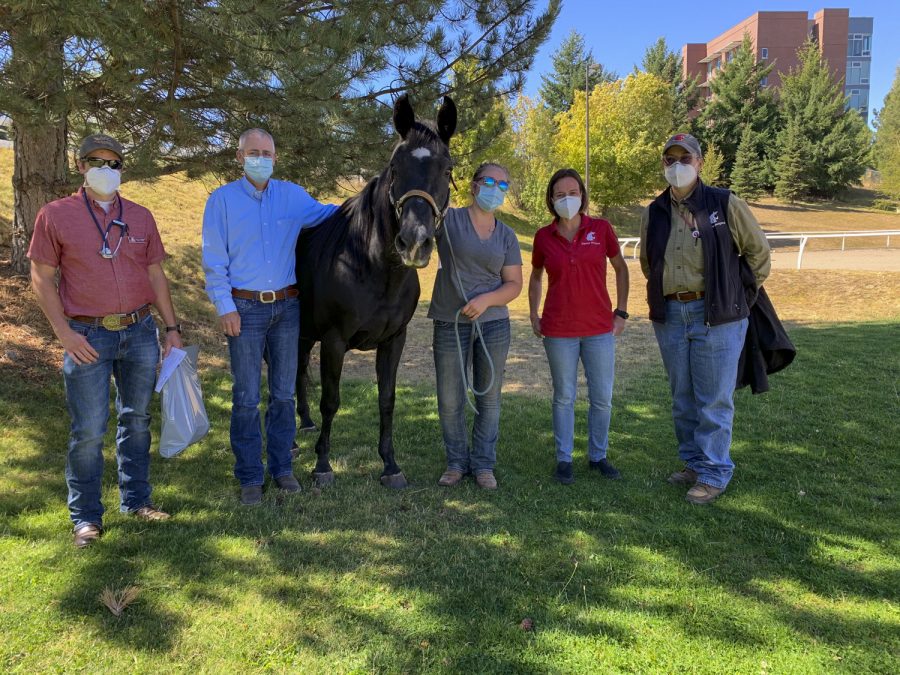WSU veterinarians saved horse with colic
Horses tend to get colic in fall; one percent of horses need surgery
Sugar stands with her owner and the people who helped her after she got severe colic. The horse was lying down in a trailer and had to be brought into the veterinary hospital on a sled.
October 8, 2020
When a horse came in with a Christmas tree-shaped tumor, veterinarians at WSU rushed her into surgery, saving her life.
The horse, named Sugar, was lying down in her owner’s trailer when she arrived, said Dr. Macarena Sanz, doctor of veterinary medicine with a specialty in equine internal medicine.
“We had to anesthetize her inside the trailer and transport her on a sled into the building,” she said.
Sugar had a severe case of colic, Sanz said. The horse had a tumor that wrapped itself around her intestines.
“This was the cause of her colic,” she said. “This blockage was causing gas to be trapped in her intestine.”
Colic is severe pain in the stomach, said Dr. Kelly Farnsworth, Sugar’s surgeon and doctor of veterinary medicine with a specialty in equine surgery.
The condition can range from mild to severe, Sanz said. Mild colic requires hourly care, but not surgery. Colic is common in horses. While most horses will develop the condition, the majority will survive, she said.
Farnsworth said a horse’s intestines are mobile. Because they ferment their food, it can cause their intestinal tract to move a lot. This can produce a buildup of gas.
Sanz said that if enough gas builds up, a lesion can form. The survival rate drops the longer the lesion is there.
“Sugar’s owner knew something was wrong and trailered her immediately to WSU,” she said.
Sugar was “lucky,” Sanz said. Her owner works as a veterinary technician and is knowledgeable.
About one percent of horses need surgery to treat their colic, Farnsworth said. The success rate can range from 40 to 90 percent and does depend on the severity of the colic.
“I tell people that there is a 50/50 chance [of survival] until we actually get in there and see what’s going on,” he said.
WSU veterinary medicine sees a lot of colic cases during the fall because of a change in horses’ diets, Sanz said.
Horses are creatures of habit, Farnsworth said. Making sure they have access to the same food and water is critical. If a horse has a drastic change in diet, the horse can develop colic because the food can produce more gas than normal in their body.
“We recommend that people manage their water intake,” Sanz said. “Horses prefer to drink warm water, and heated water will encourage them to drink.”
If horses become dehydrated, they can also develop colic, she said. Flavored water can be a good additive to encourage a horse to drink.
Farnsworth said it can be hard to tell if a horse has colic. Many horses will look at their sides, paw at the ground, lay down or roll.
“Some horses are also drama queens, and some are stoic,” he said. “This is why it can be difficult to know if something is going on.”











